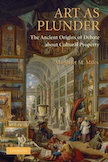
Author – By: Margaret M. Miles
This book examines the ancient origins of debate about art as cultural property. What happens to art in time of war? Who should own art, and what is its appropriate context? Should the victorious ever allow the defeated to keep their art? These questions were posed by Cicero during his prosecution of a Roman governor of Sicily, Gaius Verres, for extortion. Cicero’s published speeches had a very long afterlife, affecting debates about collecting art in the 18th century and reactions to the looting of art by Napoleon. The focus of the book’s analysis is theft of art in Greek Sicily, Verres’ trial, Roman collectors of art, and the later impact if Cicero’s arguments. The book concludes with the British decision after Waterloo to repatriate Napoleon’s stolen art to Italy, and an epilogue on the current threats to art looted from archaeological contexts. Margaret M. Miles is an archaeologist and art historian, now Professor of Art History and Classics at the University of California, Irvine. She has held fellowships at the American School of Classical Studies in Athens, the Institute for Advanced Study in Princeton, and the American Academy in Rome. She has excavated at Corinth and Athens, and did architectural fieldwork at Rhamnous in Greece and at Selinunte and Agrigento in Sicily. Her earlier publications include a study of the Temple of Nemesis at Rhamnous (Hesperia, 1989) and a volume in the Agora excavation series on the City Eleusinion, the downtown Athenian branch of the Eleusinian Mysteries (The Athenian Agora, Vol. 31: The City Eleusinion, 1998).
Industry Reviews
‘Margaret Miles deals with the sadly timely issue of art as plunder levelly and with sensitivity. Her study is not only well researched and sound, but also a very good read and as such easily accessible not only to scholars, but equally to undergraduates and a wider interested public. Broaching much wider issues than the historical extortion of Verres, the reception of concepts of art as cultural property and the ways of dealing with plundered art across the centuries are today highly pertinent and make this a very important book.’ Bryn Mawr Classical Review